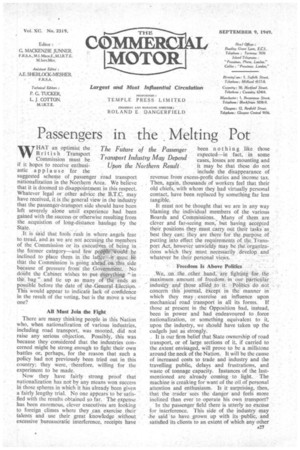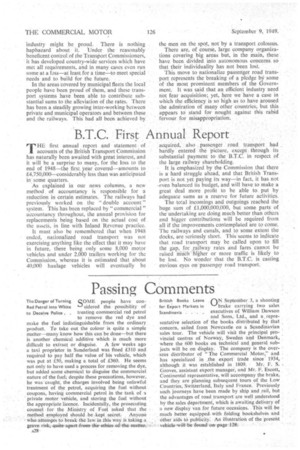Passengers in the ivielting Pot
Page 29

Page 30

If you've noticed an error in this article please click here to report it so we can fix it.
WHAT an optimist the British Transport Commission must be if it hopes to receive enthusiastic applause for the suggested scheme of passenger road transport nationalization in the Northern Area. We believe that it is doomed to disappointment in this respect. Whatever legal or other advice the B.T.C. may have received, it, is the general view in the industry that the passenger-transport side should have been left severely alone until experience had been gained with the success or otherwise resulting from the acquistion of long-distance haulage by the State. , It is said that fools rush in where .angels fear to tread, and as we are not accusi,ng the members a the Commission or its executives Of being in the former category—and few peoprAvould be inclined to place them in the latter--it must be that the Commission is going ahead on this side because of pressure from the Government. No doubt the Cabinet wishes to put everything in the bag " and tie up as many of the ends as possible before the date of the General klection. This would appear to indicate lack of confidence in the result of the voting, but is the move a wise one?
All Must Join the Fight There are many thinking people in this Nation who, when nationalization of various industries, including road transport, was mooted, did not raise any serious objection. Possibly, this was because they considered that the industries concerned might be strong enough to fight their own battles or, perhaps, for the reason that such a policy had not previously been tried out in this country; they were, therefore, willing for the experiment to be made.
Now they have fairly strong proof that nationalization has not by any means won success in those spheres in which it has already been given a fairly lengthy trial. No one appears to be satisfied with the results obtained so far. The expense has been enormous, clever executives are looking to foreign climes where they can exercise their talents and use their great knowledge without excessive bureaucratic interference, receipts have been no like those expected—in fact, in some -cases, losses are mounting and it may be that these do not include the disappearance of revenue from excess-profit duties and income tax. Then, again, thousands of workers feel that their old chiefs, with whom they bad virtually personal contact, have been replaced by something far less tangible.
It must not be thought that we are in any way blaming the individual members of the various Boards and Commissions. Many of them are clever and far-seeing men, but having accepted their positions they must carry out their tasks as best they cam; they are there for the purpose of putting into effect the requirements of the Transport Act, however unwieldy may be the organizations which they must necessarily develop and whatever be their personal views.
Freedom Is Above Politics ...Weon-the_ other hand, are fighting for the maximum amount of freedom in our particular industry and those allied to it Politics do not concern this journal, except in the manner in which they may exercise an influence upon mechanical road transport in all its forms. If those at present in the Opposition had, instead, been in power and had endeavoured to force nationalization, or something equivalent to it, upon the industry, we should have taken up the cudgels just as strongly. , It is our firm belief that State ownership of road transport, or of large sections of it, if carried to the extent envisaged, will prove to be a millstone around the neck of the Nation. It will be the cause of increased costs to trade and industry and the travelling public, delays and frustrations, and waste of tonnage capacity. Instances of thelastmentioned are already coming to light. The machine is creaking for want of the oil of personal attention and enthusiasm. Is it surprising, then, that the trader sees the danger and feels more inclined than ever to operate his own transport?
In the passenger field there is utterly no excuse for interference. This side of the industry may be said to have grown up with its public, and satisfied its clients to an extent of which any other industry might be proud. There is nothing haphazard about it. Under the reasonably beneficent control of the Transport Commissioners, it has developed country-wide services which have met all requirements, and in many cases even run some at a loss—at least for a time—to meet special needs and to build for the future.
In the areas covered by municipal fleets the local people have been proud of them, and these transport systems have been able to contribute substantial sums to the alleviation of the rates. There has been a steadily growing inter-working between private and municipal operators and between these and the railways. This had all been achieved by the men on the spot, not by a transport colossus.
There are, of course, large company organizations covering big areas but, in the main, these have been divided into autonomous concerns so that their individuality has not been lost.
This move to nationalize passenger road transport represents the breaking of a pledge '11,'■ some of the most prominent members of the Government. It was said that an efficient industry need not fear acquisition; yet, here we have a case in which the efficiency is so high as to have aroused the admiration of many other countries, but this appears to stand for nought against this rabid fervour for misappropriation.




























































































